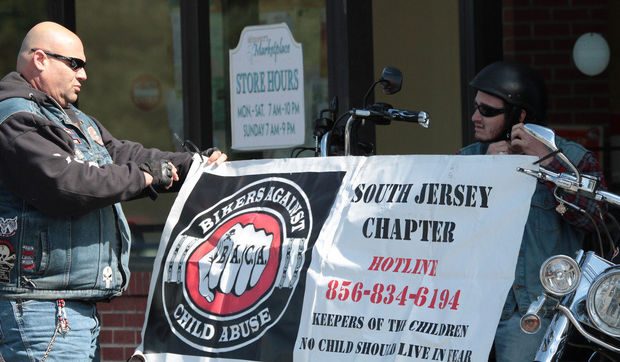No matter when the phone rings, Khaos is ready to throw on his denim vest and hit the road on his motorcycle.
Only Khaos isn’t racing off to meet up with a gang of rough and tough bikers – he’s riding to the rescue of kids who have been terrified by sexual, physical and emotional abuse.
Khaos is the New Jersey chapter president of Bikers Against Child Abuse (BACA) in Marlton. Members, who all go by a road name, are on call 365 days a year to sit watch at children’s homes to calm fears that their abuser might show up or to walk into court with those kids to empower them as they face their abuser.
“I once sat outside of a young boy’s house all night long, because he was afraid his abuser was going to return. Every half-hour, the blinds would lift, and the boy would look out to make sure I was still standing outside,” says Khaos. “When the sun rose, the boy eventually headed off to school on the bus, and I followed on my motorcycle.”
“We get plenty of ‘I’m afraid’ calls, but most of the time the kids just want someone to talk to,” adds Khaos. “The minute these kids see and know we’re there for them, it’s monumental. It changes their lives.”
BACA members like Khaos have been showing up for kids for more than 20 years. The nonprofit organization was founded by Chief, a social worker and proud biker who worked directly with children of abuse and saw them being repeatedly confronted or intimidated by their perpetrator.
According to BACA history, Chief invited 40 bikers to an abused child’s house for a barbecue. Later that day, the child’s mother called to report that for the first time in months, he was riding
his bike around the neighborhood. Using that child’s progress as an example, Chief approached his biker friends about forming BACA, which now operates chapters throughout 48 states and nine countries.
Much of the reason BACA “works” is because of the bikers’ intimidating presence, says New Jersey chapter vice president Chuckles. But he points out that the tough-guy biker stigma often comes with the misconception that BACA members are vigilantes who show up at a child’s home to roughen up their abuser.
“By doing that, how can I empower the kid? Because now I’m locked up,” says Chuckles. “We don’t have any contact with that person. That’s why we work. Because we show these kids and the public it’s all about empowerment. It also flips a switch that we’re not out here to beat people up.”
The process to become a BACA member isn’t easy. Prospective members must have a motorcycle, be 18 or older and submit to a federal, fingerprinted background check. They must also attend monthly BACA meetings, rides, court hearings and other BACA events for at least one year before being considered for membership in their local chapter.
Children are referred to their local BACA chapter by child welfare agencies, attorneys, counselors or parents. Khaos explains that once a child has been referred to his chapter, the entire New Jersey BACA group will ride to the child’s home to introduce themselves and welcome him into their tight-knit biker community. The child is also given a vest with a BACA patch sewn onto the back and given the contact info for two BACA members they can call or text whenever they’re in need.
Before each initial visit, the BACA riders are briefed on the child’s traumatic triggers, which can include phrases or actions that remind them of their abuser.
“Once, we rode up to a girl’s house, and we were told, ‘No physical touch.’ So, no fist bump, no high-five, nothing. So, we sat there, hung out and had lunch together for about an hour and a half,” says Web, who serves as the New Jersey chapter secretary. “As we’re getting ready to leave, the girl went around and hugged every person, and her mother started crying.”
“Our lives are changed just as much as theirs are, with each and every kid. That’s our fuel, that’s what keeps us going,” adds Web. “We’re riding in the rain and snow – but that’s nothing compared to what these kids have gone through.”
When the kids under their watch have to attend court dates or parole hearings, Khaos says that he and his fellow BACA members have been known to form a human wall around them to help them feel safe as they enter the courtroom. But hearing the kids recount their stories of abuse to a judge can be difficult, even for these grown men.
“It’s the absolute hardest part,” says Chuckles. “That kid could be looking around testifying, and when they look right at you, you can’t be crying or all emotional. You’ve got to stick your tongue out and smile at them to show them, ‘You can do this.’”
Knowing that their work has a lasting impact on these kids is what keeps them riding, says Web.
“The national BACA organization did a clinical study on the children who’ve utilized BACA,” he says. “The statistics show that 35 percent of abused children become abusers themselves, but with BACA children that gets reduced to about 7 percent. It’s a huge difference – it makes a lasting impact for the rest of their lives and breaks that chain of abuse for generations to come.”
Many of the kids stay in touch with their BACA contacts well beyond childhood, and Khaos says his chapter members have even visited former BACA kids who are attending college. Others keep in touch by texting him on his birthday or on Father’s Day, because, he says, “Once a BACA child, always a BACA child.”
“As a BACA member, you will lose sleep, time at work, pay and time with your family. You will be judged and called names. You’re going to ride in the cold and in the rain, and put your own life at risk more often than you probably would have before,” says Khaos.
“You’re not going to be reimbursed for your gas,” he adds, “and your time will never be given back to you. But that one kid you ride to visit is going to run through a crowd of people to come hug you. All of that’s worth it.”














